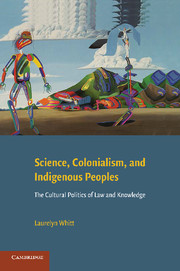PART I - BIOCOLONIALISM AS IMPERIAL SCIENCE
Published online by Cambridge University Press: 04 August 2010
Summary
Biocolonialism is in many respects more of the same – a continuation of the oppressive power relations that have historically informed the interactions of western and indigenous cultures, and part of a continuum of contemporary practices that constitute forms of cultural imperialism. The first three chapters contextualize biocolonialism over time and within the broad range of these ongoing cultural practices. The phenomenon of cultural imperialism is addressed and critiqued. It is demonstrated to be consistent with (indeed, a continuation of) earlier forms of imperialism, and a preliminary sketch of biocolonialism is offered. The latter is then situated within the larger political struggles that have long inflected the relationship between dominant and indigenous knowledge systems.
The deep offensiveness and cultural destructiveness of biocolonialist practices can only be fully appreciated by seeing how profoundly they clash with many of the values and commitments that characterize and distinguish indigenous knowledge systems. The commodification of knowledge and of genetic resources that biocolonialism facilitates is sharply at odds with the web of prescriptions and proscriptions that guide the process of knowing within indigenous contexts. It also clashes directly with the role responsibilities toward the natural world that many indigenous peoples have historically assumed. The ideology that sustains biocolonialism is, in turn, rooted in the neopositivist assumption of value neutrality and in a practice of value bifurcation which together enable it to deflect ethical and political critique. It both facilitates the marginalization of indigenous knowledge systems and provides thereby a legitimating rationale for biocolonialist practice.
- Type
- Chapter
- Information
- Science, Colonialism, and Indigenous PeoplesThe Cultural Politics of Law and Knowledge, pp. 1 - 2Publisher: Cambridge University PressPrint publication year: 2009



